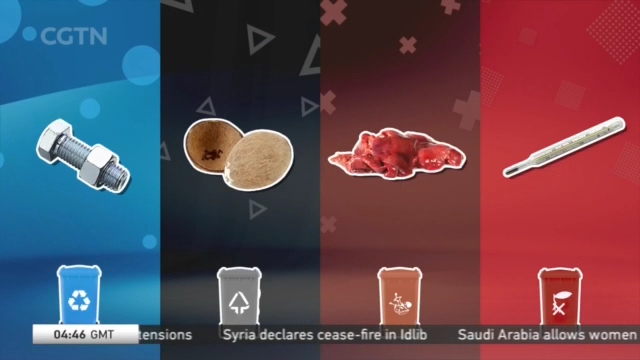
13:23, 02-Aug-2019
Trash Redefined: Resident habits change with new garbage policies
Updated
14:29, 02-Aug-2019

Nearly a month into an environmentally-friendly garbage sorting policy in Shanghai, we ask residents there how to classify waste into residual, household food, recyclable and hazardous, and they might surprise you. In the second episode of our series Trash Redefined, CGTN's Yang Chengxi takes us there and introduces us to a couple who has become quite the garbage gurus.
For many in Shanghai, this has become one of life's greatest questions: What sort of trash is this? They have become master analysts. Taking things apart, sorting and disposing different waste into four bins respectively. Like many young couples today, Max and Janice order take-out food more often than cook. With Shanghai's new garbage-sorting rule, dealing with these lunchboxes and leftovers is quite a challenge: what should go where?
MAX MOU & JANICE TONG SHANGHAI COUPLE "Yes we got into a lot of arguments everyday like...(J) you remember you left a big bowl in the household food waste, and I was caught by a volunteer lady."
Garbage sorting volunteers! There are about 30 thousand of them across all major communities in the city.
YANG CHENGXI SHANGHAI "They are retirees with rigorous eyes for any sorting mistakes, helping residents stick to the rule."
MAX MOU & JANICE TONG SHANGHAI COUPLE "You know the lady is always picking bones with us, literally bones. So at first, we thought all the bones belonged to residual waste but, no. Basically mainly they are household food waste. But for the big parts, they should be residual waste."
If this plastic bowl is to go into the recycle bin, there shouldn't be liquid inside, otherwise, it'd be rejected by the volunteers.
They've been practicing for two months to get better at sorting. And the couple says it is surely worth the hassle for the sake of the environment.
MAX MOU & JANICE TONG SHANGHAI COUPLE "In the last decade we didn't think too much about waste processing. That's because others take the job. But now we should take more responsibilities on the communities."
The new rule has changed people's habits in more ways than most imagined. Just a week after it took effect, requests to not have disposable chopsticks delivered with food on China's biggest food delivery app has more than doubled in Shanghai.
It's garbage time. Now that the government has set specific time slots for garbage disposal, taking out the trash has become somewhat ceremonial.
MAX MOU & JANICE TONG SHANGHAI COUPLE "If I'm working late, my boss won't let me go, because she won't believe I want to catch up with the deadline of the sorting time."
They are two of the 24 million Shanghai residents now going through the same process: from confused about garbage sorting to making it a habit. The couple says these few months will be an interesting time to look back on in the future.
Now that the different types of garbage are all in the bins they belong, where do they all go from here? In the next episode, we explore how China is upgrading its waste treatment methods. YCX CGTN SHANGHAI.
SITEMAP
Copyright © 2018 CGTN. Beijing ICP prepared NO.16065310-3
Copyright © 2018 CGTN. Beijing ICP prepared NO.16065310-3